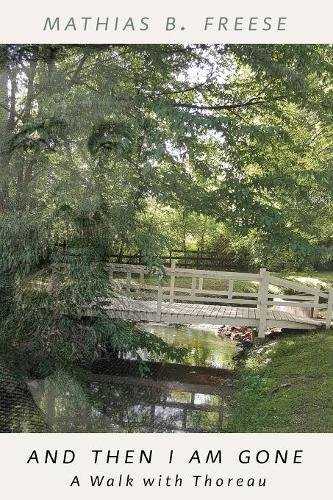 Because the text is minimal and the pictures large, it’s easy to follow along, especially if you’ve done yoga before. It might be a little trickier for absolute beginners, although none of the poses are particularly complex. The book can also be used as inspiration, as a way of adding to an existing practice with a few new poses, meditations or visualisations. All in all, Kilted Yoga is a bonny wee resource to help anyone get the most out of a regular yoga practice.
Because the text is minimal and the pictures large, it’s easy to follow along, especially if you’ve done yoga before. It might be a little trickier for absolute beginners, although none of the poses are particularly complex. The book can also be used as inspiration, as a way of adding to an existing practice with a few new poses, meditations or visualisations. All in all, Kilted Yoga is a bonny wee resource to help anyone get the most out of a regular yoga practice.
Author:
A review of And Then I Am Gone by Mathias B Freese
 Not only do Freese and I concur on how a psychotherapist best engages with a client, but our approach to writing books also bisects. I too write to try to understand myself, indeed without outlines or a rigid plot structure. I daresay he would nod eagerly in understanding that your characters, given the chance, tell the story for you if you’ll listen to them, and in a more honest, exciting way.
Not only do Freese and I concur on how a psychotherapist best engages with a client, but our approach to writing books also bisects. I too write to try to understand myself, indeed without outlines or a rigid plot structure. I daresay he would nod eagerly in understanding that your characters, given the chance, tell the story for you if you’ll listen to them, and in a more honest, exciting way.
A review of Missing Christina by Meredith Whitford
 Whitford effortlessly interacts her characters along with their assorted baggage across many oceans and towards the inevitable discovery of their mother’s past. Along the way a realistic account is set within these families’ boundaries and excellently detailing every aspect of domestic interaction. But what about this secret? I’m not impatient, just tantalised and compelled to find out. Chapter 13 draws me into Whitford’s net and from now on my curiosity holds no limits as now the story darkens.
Whitford effortlessly interacts her characters along with their assorted baggage across many oceans and towards the inevitable discovery of their mother’s past. Along the way a realistic account is set within these families’ boundaries and excellently detailing every aspect of domestic interaction. But what about this secret? I’m not impatient, just tantalised and compelled to find out. Chapter 13 draws me into Whitford’s net and from now on my curiosity holds no limits as now the story darkens.
An interview with Lex Hirst
 Hirst enjoys the liaison aspect of her role, assisting to demystify much of what can be an opaque industry for authors while also finding burgeoning talent. ‘I think that it’s helpful and part of the reason I do go to events and chat to people, is to try and help people get an idea of who the publishing houses are here and how the system works and try to make that a bit clearer.’
Hirst enjoys the liaison aspect of her role, assisting to demystify much of what can be an opaque industry for authors while also finding burgeoning talent. ‘I think that it’s helpful and part of the reason I do go to events and chat to people, is to try and help people get an idea of who the publishing houses are here and how the system works and try to make that a bit clearer.’
A review of The Night The Penningtons Vanished by Marianna Huesler
 Discourse between the characters is credible, believable and plausible as the girls wrangle among themselves, tussle with Aunt Tallulah and seemingly snag setups, circumstances and explanations out of the air to describe what is happening. Heusler’s capability for portrayal, scene setting and elucidation serves her well, The reader is drawn right into settings: we see the frightening, feel the cold, and taste the bitterness. The storyline is well plotted, moves along from first pages to final paragraphs without problem, and culminates with a satisfying conclusion.
Discourse between the characters is credible, believable and plausible as the girls wrangle among themselves, tussle with Aunt Tallulah and seemingly snag setups, circumstances and explanations out of the air to describe what is happening. Heusler’s capability for portrayal, scene setting and elucidation serves her well, The reader is drawn right into settings: we see the frightening, feel the cold, and taste the bitterness. The storyline is well plotted, moves along from first pages to final paragraphs without problem, and culminates with a satisfying conclusion.
Interview with Carol Smallwood
 The author of In Hubble’s Shadow talks about her latest poetry book, the relationship between form and content, the value of poetry, her influences, advice for new writers, her work-in-progress, and lots more.
The author of In Hubble’s Shadow talks about her latest poetry book, the relationship between form and content, the value of poetry, her influences, advice for new writers, her work-in-progress, and lots more.

We have a copy of Come Rain or Shine by Tricia Stringer to giveaway.
To win, sign up for our Free Newsletter on the right hand side of the site and enter via the newsletter. Winner will be chosen by the first of December from subscribers who enter via the newsletter.
Good luck!
A review of Shriek: an absurd novel by Davide A Cottone
 Perhaps the cover says it all? Yes, you can begin to judge this particular book by its cover because inside and throughout all those white pages a hurricane is at work endeavouring to yank everything of life’s rationalizations into shards of disbelief.
Perhaps the cover says it all? Yes, you can begin to judge this particular book by its cover because inside and throughout all those white pages a hurricane is at work endeavouring to yank everything of life’s rationalizations into shards of disbelief.
Interview with Jessica Townsend
Jessica Townsend, the author of Nevermoor: the Trials of Morrigan Crow drops by to read from and chat about her book, which has been had the biggest children’s debut in the Australian market since records began. We talk about the book’s outrageous…
An interview with Jane Owen
 The author of The Bitches of Suburbia talks about the real life suburb behind her book, her inspiration, her favourite humorous books, tips for aspiring writers, reveals a few secrets including her next book, and lots more.
The author of The Bitches of Suburbia talks about the real life suburb behind her book, her inspiration, her favourite humorous books, tips for aspiring writers, reveals a few secrets including her next book, and lots more.